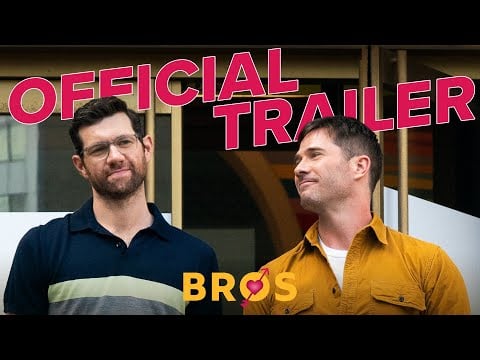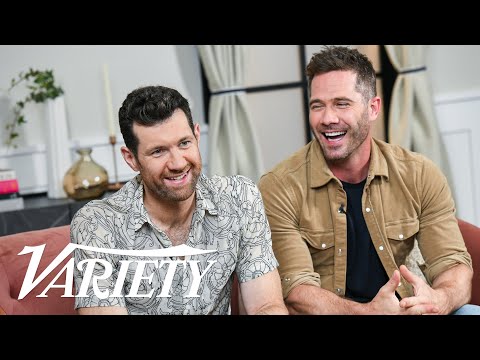Gay-themed romances aren’t new to Tinsel Town. Think “Brokeback Mountain,” “Happiest Season” and “Call Me By Your Name,” for starters.
“Bros” is still a very different kind of film. It’s a rom-com featuring two male characters with all the trappings of a major studio release.
Everything else here is unapologetically heterodox.
The film’s frank depictions of gay sex, culture and identity set it far apart from any mainstream movie. All of the above suggests the story might coast on those factors, content that its groundbreaking nature requires little else in our woke age.
Instead, “Bros” delivers well-defined characters, smart dialogue and, best of all, laughter. The story’s insistence on diving into a “grooming” culture war battle, though, may lose a sizable group of viewers.
It’s an unforced error in a story seeking, and mostly earning, widespread approval.

Billy Eichner stars as Bobby, a podcaster whose love life consists of one-night stands, courtesy of Grindr. He’s smart and cynical, and he’s not pining for a relationship of any kind.
Just. Not. Interested.
And then he meets Aaron (Luke Macfarlane), a hulking gent who holds the same mindset. The two flirt and fight between awkward sexual encounters, but they slowly realize how much they enjoy each other’s company.
That’s where the cultural complications kick in.
Bobby’s social warrior bona fides come first, always. Aaron, who presents as a traditional (read: straight) male straddles his gay and heterosexual worlds. Both bring plenty of baggage to the courtship, and it’s here where “Bros” assembles its sharpest commentary.
And boy, does “Bros” drown in commentary.
View this post on Instagram
Bobby is spearheading a new LGBTQ+ museum project, with his fellow creators bickering about President Abraham Lincoln’s gay vibes and other issues. The film stops over and again to deliver a lecture on gay rights, historical punishments and more.
The Stonewall riots get repeatedly name-checked before the first act wraps.
“Bros” just can’t help itself, but it should.
Yet when Bobby breaks down why his confident façade is just that, the movie soars. He shares the hurt he’s accumulated over time, and it speaks to cultural injustices far better than any ham-fisted lecture.
The film generates some laughs by poking fun at the Hallmark Channel, both its lineup of bland originals and the way the woke Left forced it to embrace sexual diversity. On screen, it’s cynically suggested Hallmark was chasing dollar signs, not bowing to Cancel Culture.
The sly, unspoken gag? Macfarlane starred in several Hallmark originals.

Eichner, who co-wrote the script, has a mile-a-minute style that perks up every scene, and he’s not afraid to give Bobby real flaws. The rest falls in the capable hands of director Nicholas Stoller (“Forgetting Sarah Marshall”), who has a keen sense of both comic timing and making the most of every punch line.
Traditional audiences may still squirm from start to finish.
Along the way we’re treated to throuples, gay orgies, anonymous sex and a dash of foot worship. Eichner is holding nothing back here, going so far as to gently critique gay culture at times without drawing satirical blood.
“Bros” includes several off-putting scenes that may upend the film’s plea for tolerance. An early sequence finds Bobby talking to a straight couple and their young children present. The chat veers into gay sex details, and Bobby asks, and rightly so, if the conversation is appropriate for young ears.
The woke parents just shrug, as if any element of the gay lifestyle must be embraced by children of any age.
No exceptions.
Later, Bobby argues with Aaron’s mother (Amanda Bearse), an elementary school teacher, that gay history should be introduced to second graders. The film later doubles down on the argument, akin to a victory lap.
“I didn’t know if that was ever going to come along for me in my career.” After years as a Hallmark Channel hunk, #BrosMovie star Luke Macfarlane finally nabbed the romantic lead of his dreams — and on his own terms: https://t.co/Dag8jZt7Ze pic.twitter.com/zpuo8ngwyY
— IndieWire (@IndieWire) September 29, 2022
A line likely to alienate viewers from both ideological sides? A character notes that two-thirds of her child’s grammar-school class mates consider themselves “non-binary.”
Later, Bobby lovingly recalls his parents taking him to a play where the male cast appears fully nude. It’s meant to show how children must be exposed to gay relationships and issues. Many will recoil at the context given Bobby’s age at the time. He was 12.
No matter your political leanings, “Bros” is, yes, an inclusive step for an industry that kept gay stories off-screen for decades. Eichner and co.’s eagerness to embrace culture war issues may work against the progress it seeks.
HiT or Miss: “Bros” offers a different kind of rom-com, but it falls back on the genre’s better elements to power its love story.
The post ‘Bros’ Embraces Best Rom-Com Tropes appeared first on Hollywood in Toto.